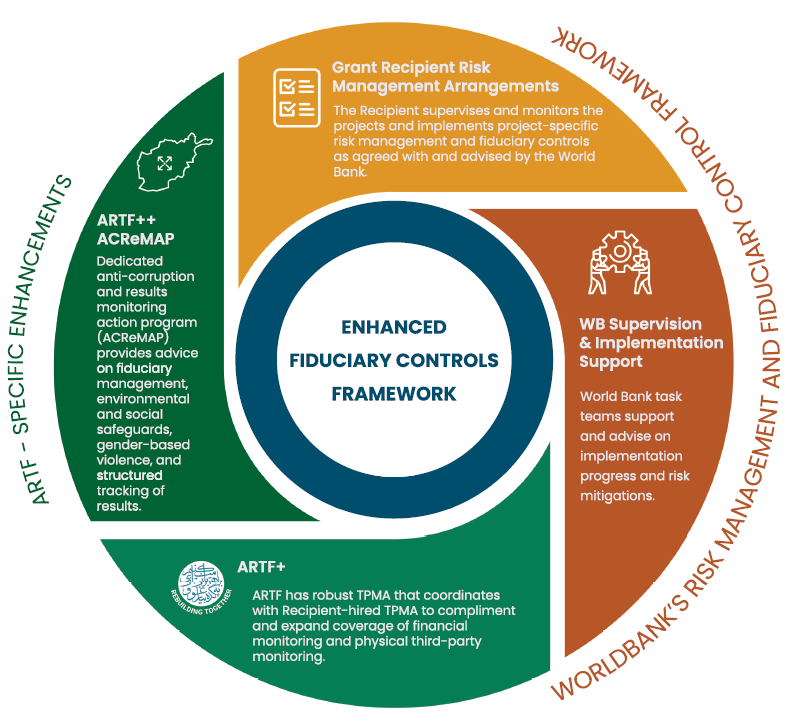The World Bank administers the ARTF with integrity and an emphasis on ensuring value for money in ARTF financing.
In an environment as complex as Afghanistan, the World Bank has robust systems to ensure that ARTF funds are spent as intended to deliver development results. It works closely with implementing partners (UN agencies) to monitor and support the implementation of programs. All World Bank projects include grievance redress mechanisms and empower citizens to raise concerns. The ARTF partnership finances additional fiduciary measures that provide controls tailored specifically to Afghanistan’s current context. These measures complement the alignment and coordination benefits of the ARTF with robust transparency and accountability mechanisms.
Enhanced Fiduciary Control Framework

Read more about ARTF's Enhanced Fiduciary Control Framework
As the ARTF Administrator, the World Bank applies a multi-layered fiduciary and monitoring control framework to ARTF projects that aims to establish strong controls and generate continuous learning. The approach combines the World Bank’s regular risk management and fiduciary control framework complimented by those of our implementing partners, with ARTF-specific enhancements, including third-party monitoring covering both fiduciary controls and project monitoring and a portfolio-wide emphasis on fiduciary and safeguards measures. An independent unit within the World Bank, the Integrity Vice Presidency, investigates and pursues sanctions related to allegations of fraud and corruption in World Bank financed projects, including projects financed by WB-administered trust funds such as the ARTF. The World Bank provides multiple channels, both attributable and anonymous, for reporting concerns about corruption.
Learn more about how to report a concern about corruption.
Third Party Monitoring
Anti-Corruption and Results Monitoring Action Program (ACReMAP) finances one of the largest third-party monitoring programs in the World Bank, designed to provide extensive support to supplement project supervision in Afghanistan. Since January 2020, a Third-Party Monitoring Agent (TPMA) consortium has provided all third-party monitoring services. The TPMA scope of work has evolved in the past year to include portfolio-wide financial monitoring, physical monitoring, and a range of reporting and data collection services to support World Bank’s analytics under a single contract financed through the ARTF ACReMAP window.
Under the current modality of project implementation through UN agencies, ARTF TPMA activities complement UN-hired third-party monitoring activities.
The scope of work for the ARTF Third Party Monitoring Agent focuses on:
Monitoring of Projects: Integrated oversight of the project implementation performance, and compliance with fiduciary, environmental, and social standards. Monitoring project-specific Entry Criteria for Access to assure the conditions for continuing the project are in place, as approved by the management of the World Bank and ARTF.
Economic Monitoring and other data collection: Field-based gathering of relevant economic data points on a monthly basis. Other data such as gender inclusion status in basic services and public financial management are among important data collected by the TPMA.
Data and Knowledge Management: Collect data in the field using Survey CTO software. Maintain and enhance the digital platform for the World Bank and UN teams to directly access location visit data. Present project and sector monitoring data as interactive PowerBI dashboards. Develop a mobile application to access monitoring data and reports.
Ad hoc Activities: One-time review of the hospital infrastructure in Afghanistan, monitoring of any new projects prepared, and any other ad hoc requirements.